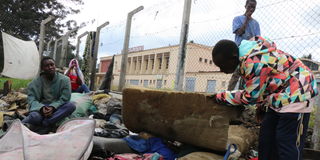Nakuru and street families: A love-hate story spanning decades

A boy ramages through the beddings and personal belongings of his colleagues after demolition of the makeshift home belonging to street families on June 6,2025.
Street children and families have existed in Nakuru since time immemorial, and with its gaining of city status, this number was bound to go up.
As of 2024, that number stood at over 1,300.
They have also long been stereotyped for how they look and present themselves, and recent events are no different.
If you have had an opportunity to interact with them you’d easily come to the conclusion that some have been dealt the short stick while for others, it is complicated.
As crime rates rise in Nakuru town, street families say they are once again bearing the brunt of suspicion despite what they describe as a longstanding relationship with the CBD.
They claim recent efforts by an informal vigilante group to “restore order” have continued to fuel the stigma, with street-connected individuals becoming almost the first to be accused whenever incidents occur.
Accusations of petty theft and vandalism have intensified in recent weeks, with the vigilante group quick to point fingers at street children and families.
But members of this community say they are being unfairly profiled, arguing that the crackdown is more about appearance and poverty than actual wrongdoing.
“We’re the first people they look at when something goes missing. But we also help guard these shops and no one dares come to steal when we are around,” says Angus*.
“If one of us is hurt, no one comes, adding that the city only pays attention when there is a problem to blame them for,” he says sadly.
While speaking to Nancy Ndegwa, alias Mama Street, she said the same thing happened in 2024.
“Last year the same happened. Goons were coming with masks and beating the street children. Then we had a roundtable discussion with the county government and it stopped immediately,” she recalls.
Ahead of the town’s elevation to city status, street families were also rounded up in a move seen by many as cosmetic and dumped in Embobut and Chemasusu forests, Baringo county, in 2019 something the then administration denies.
As the city grapples with how to curb crime, members of this vulnerable group say they are tired of being treated as scapegoats.
“All we ask is to be seen as people and not people who cause problems,” says Angus.


